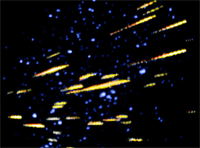Difference Between Meteor and Meteorite
 Meteor vs Meteorite
Meteor vs Meteorite
Whether you’re still in school or already working, one of the most interesting topics that you will ever come across are meteors and meteorites. But do you really know the difference between the two?
Also called shooting stars, falling stars or meteoroids, meteors are debris which are considered to be part of the Solar System. Once the meteor reaches the Earth’s atmosphere, it is called a meteor, but if it survives the impact and hits the ground, it is already called a meteorite. You might have already heard about meteor showers, a popular example of which is the Leonid meteor shower. This spectacle in the sky is definitely something to marvel at, and they occur regularly.
On the other hand, a meteorite is an object which originates from outer space. As mentioned earlier, it can already be called a meteorite if a meteor enters the Earth’s atmosphere, and then hits the ground.
What other distinct differences do these two have? Since meteors take the form of burning rocks from outer space, which can be seen streaking across the sky, most of them actually burn up before hitting the Earth. In some instances, meteors deflect off the Earth’s atmosphere and go back into space. However, the sure destination of meteorites is the Earth’s surface. Meteorites are rocks which are sometimes made up of broken pieces of planets, or they can be parts of comets.
If meteors are burning rocks, meteorites contain some metal, magnetic elements and nickel. The three basic kinds of meteorites include:
1. Aerolite – which look like ordinary stones.
2. Siderites or iron meteorites – which are very heavy.
3. Siderolites or iron-stony meteorites – which are the rarest kind, and contain almost a half-and-half percentage of iron and stone.
When it comes to their size, meteors can be too small to survive their flight to the Earth, that is why they either burn up or bounce back, while meteorites are typically larger in size, and that is why they typically survive the flight and land on the Earth’s surface.
Summary:
1. Meteors are debris considered to be part of the Solar System, and they can either burn up, hit the ground or deflect off the Earth’s atmosphere; while meteorites are meteors which hit the surface of the Earth after their flight.
2. Meteors are burning rocks, while meteorites contain a combination of metal, magnetic elements and nickel.
3. Meteors are typically small in size, while meteorites are larger.
- Difference Between NP and PA - April 25, 2010
- Difference Between Goth and Vampire - April 4, 2010
- Difference Between Our and Are - April 4, 2010
Search DifferenceBetween.net :
 Email This Post
: If you like this article or our site. Please spread the word. Share it with your friends/family.
Email This Post
: If you like this article or our site. Please spread the word. Share it with your friends/family.


Who wrote this nonsense? Even I knew before reading this that a meteorite is simply all or a part of a meteor that has reached the surface of the Earth. (“Meteoroid” in space, “meteor” as it is streaks to the ground as a fireball once inside the Earth’s atmosphere, and “meteorite” as to any parts of the meteor that do not burn up and actually reach the surface of the Earth.) Among other bad information is this article is the nonsense that a meteorite is larger than a meteor. That would never happen. Someone who knows something about astronomy/geology should write a new main post here.
Agree with Tex. From the very beginning this seems odd like it was written by a non native English speaker – so much meaning is lost, and confusion added. Also, the more you read the more it seems incorrect.
The number is 28
What an interesting article, but enough ‘already’!
Clearly, this article has been written by someone who is either confused, struggling with written English, or in a hurry to get to a dinner booking.
Someone else needs to rewrite this article if differencebetween.net is to have any credibility. In the meantime, I have advised my students to avoid this site. However, our English staff currently use this article as an example of poor & confusing writing.